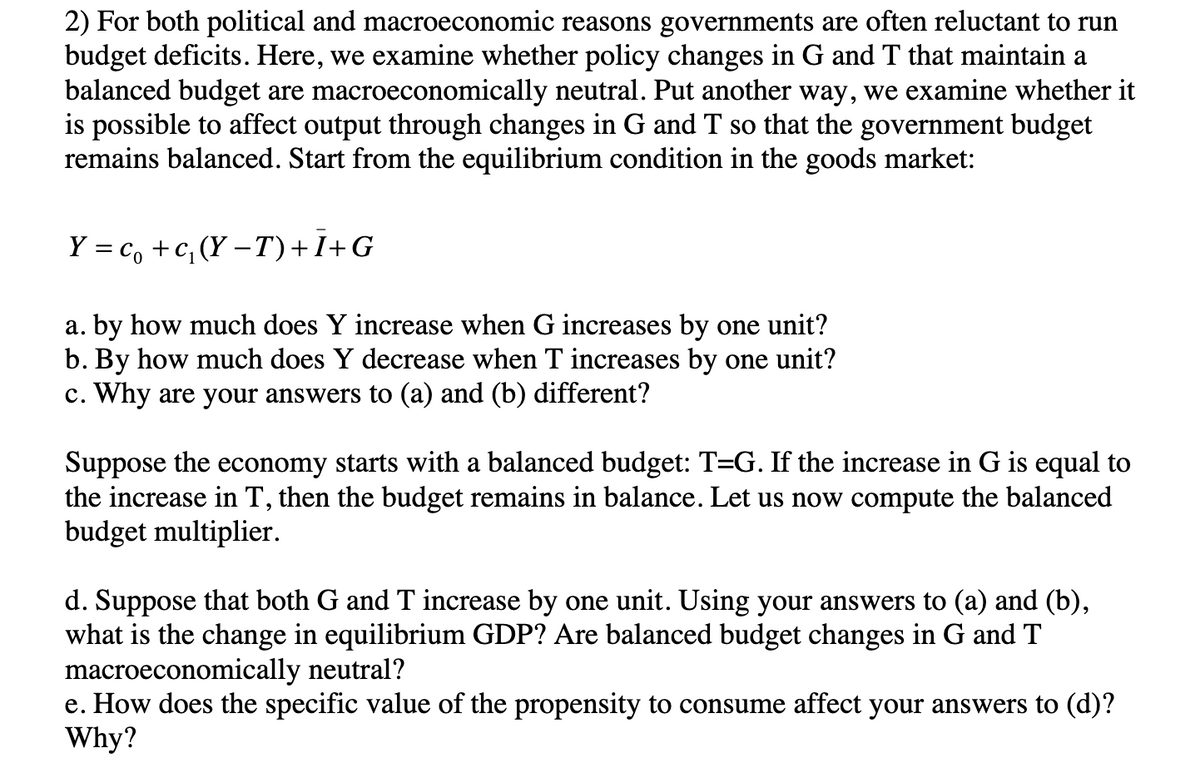d. Suppose that both G and T increase by one unit. Using your answers to (a) and (b), what is the change in equilibrium GDP? Are balanced budget changes in G and T macroeconomically neutral? e. How does the specific value of the propensity to consume affect your answers to (d)? Why?
d. Suppose that both G and T increase by one unit. Using your answers to (a) and (b), what is the change in equilibrium GDP? Are balanced budget changes in G and T macroeconomically neutral? e. How does the specific value of the propensity to consume affect your answers to (d)? Why?
Chapter17: Federal Deficits, Surpluses, And The National Debt
Section: Chapter Questions
Problem 7SQP
Related questions
Question
I need help with d and e

Transcribed Image Text:2) For both political and macroeconomic reasons governments are often reluctant to run
budget deficits. Here, we examine whether policy changes in G and T that maintain a
balanced budget are macroeconomically neutral. Put another way, we examine whether it
is possible to affect output through changes in G and T so that the government budget
remains balanced. Start from the equilibrium condition in the goods market:
Y = c +c₁ (Y-T) +I+G
a. by how much does Y increase when G increases by one unit?
b. By how much does Y decrease when T increases by one unit?
c. Why are your answers to (a) and (b) different?
Suppose the economy starts with a balanced budget: T=G. If the increase in G is equal to
the increase in T, then the budget remains in balance. Let us now compute the balanced
budget multiplier.
d. Suppose that both G and T increase by one unit. Using your answers to (a) and (b),
what is the change in equilibrium GDP? Are balanced budget changes in G and T
macroeconomically neutral?
e. How does the specific value of the propensity to consume affect your answers to (d)?
Why?
Expert Solution
This question has been solved!
Explore an expertly crafted, step-by-step solution for a thorough understanding of key concepts.
This is a popular solution!
Trending now
This is a popular solution!
Step by step
Solved in 3 steps

Knowledge Booster
Learn more about
Need a deep-dive on the concept behind this application? Look no further. Learn more about this topic, economics and related others by exploring similar questions and additional content below.Recommended textbooks for you


Brief Principles of Macroeconomics (MindTap Cours…
Economics
ISBN:
9781337091985
Author:
N. Gregory Mankiw
Publisher:
Cengage Learning

Principles of Macroeconomics (MindTap Course List)
Economics
ISBN:
9781285165912
Author:
N. Gregory Mankiw
Publisher:
Cengage Learning


Brief Principles of Macroeconomics (MindTap Cours…
Economics
ISBN:
9781337091985
Author:
N. Gregory Mankiw
Publisher:
Cengage Learning

Principles of Macroeconomics (MindTap Course List)
Economics
ISBN:
9781285165912
Author:
N. Gregory Mankiw
Publisher:
Cengage Learning

Principles of Macroeconomics (MindTap Course List)
Economics
ISBN:
9781305971509
Author:
N. Gregory Mankiw
Publisher:
Cengage Learning

Principles of Economics, 7th Edition (MindTap Cou…
Economics
ISBN:
9781285165875
Author:
N. Gregory Mankiw
Publisher:
Cengage Learning

Principles of Economics (MindTap Course List)
Economics
ISBN:
9781305585126
Author:
N. Gregory Mankiw
Publisher:
Cengage Learning